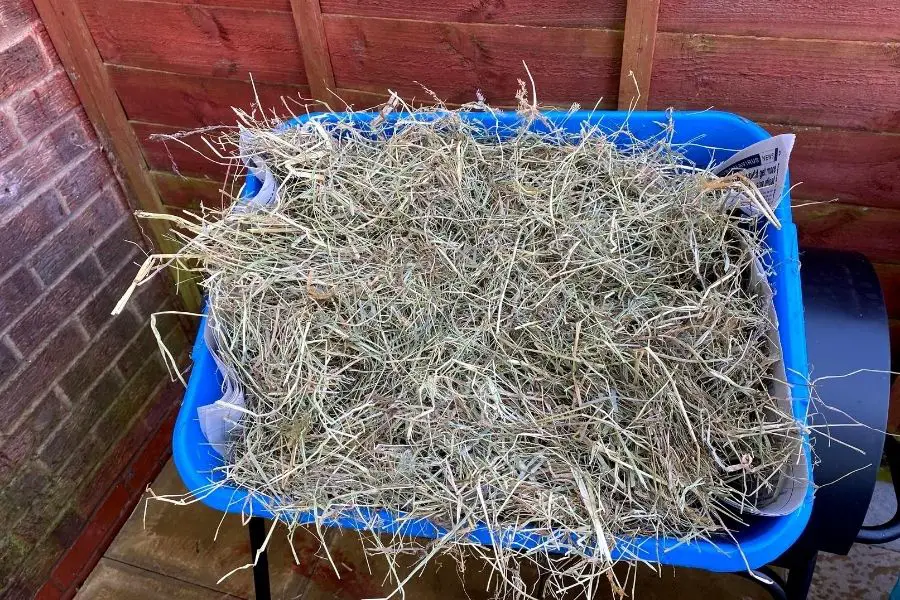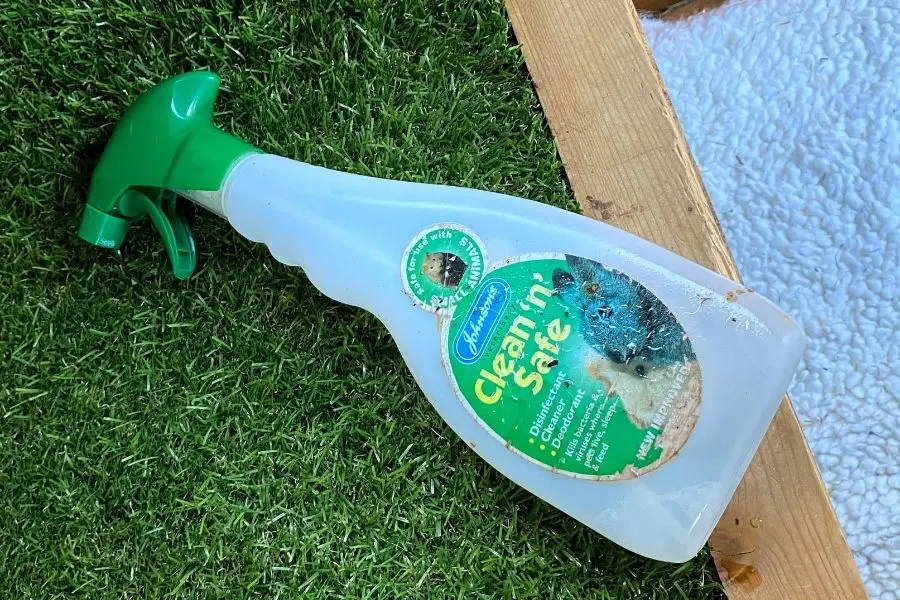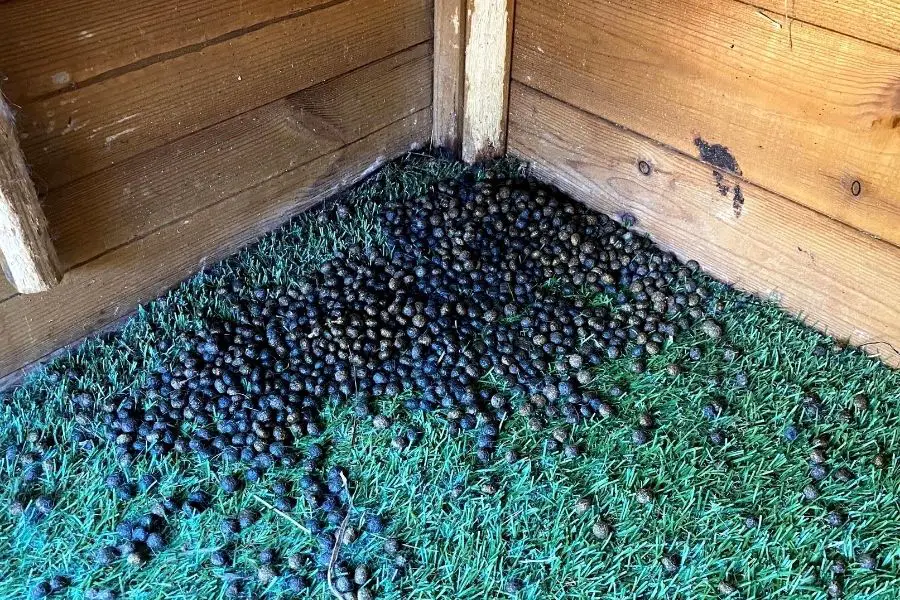Rabbits produce a lot of waste which can be quite a shock for a new owner (up to 200 droppings in a single day!). Rabbit pee can also be confusing, it can be a variety of different colors and have a powerful smell which often leads to us questioning our rabbit’s health. Often overlooked by pet owners is our own health, after all, we clean our pets often and are sometimes exposed to their waste in the course of this cleaning. So is this waste, in particular urine dangerous to humans?
Rabbit urine can be harmful to humans as it can carry spores of a harmful microorganism known as Encephalitozoon cuniculi. Though infections are rare in humans, this disease is zoonotic and can be caught by immunocompromised individuals such as those suffering from HIV.
Is rabbit urine safe to be around?
Urine is sterile when leaving the body and unless exposed to bacteria for a long period it will not pose a problem for most pet owners. However, zoonotic diseases such as the aforementioned e-cuniculi microorganism which can be present in the urine of an infected animal do pose a risk for those suffering from long-term medical conditions (whose nature or treatment has in some way compromised the effectiveness of that individual’s immune system).

As well as HIV sufferers, those on long-term steroids and cancer patients going through chemotherapy will be more susceptible to this infection and should seek their doctor’s advice if they are pet owners.
Although not a threat to the majority of the population, there are some other common concerns that all individuals should be aware of regardless of medical history. I’m going to talk about these below and also tell you some simple things you can do to avoid them becoming an issue.
Allergic reactions to rabbit urine
Another health issue related to rabbit urine is that it can cause an allergic reaction in some individuals.
Having had several rabbits and never having suffered from any issue myself, I was surprised to discover that being allergic to rabbit urine was an actual thing.
I found numerous sources including a post from Washington State University that described several allergens that have been associated with rabbits.
These exist in the rabbit’s saliva, fur (as a result of cleaning using the saliva), urine, dander, and dust. The report related mainly to staff working in close proximity to animal test subjects, but this could just as well apply to us owners who also have physical contact with our rabbits on a daily basis.
The allergic reactions related to rabbits include allergic rhinitis, conjunctivitis, pruritus (itch), asthma, and contact dermatitis (links to Wikipedia).
The report also described some symptoms of an allergic reaction including nasal discharge and congestion, conjunctivitis, tearing and eye itching, skin redness, rash or hives, and lower airway symptoms (coughing, wheezing, and shortness of breath).
You can read that detailed report here (opens in a new tab).
Dealing with an allergy to rabbits
Although an allergic reaction to rabbit urine is possible, determining it as a definite cause is difficult. Far more common is a reaction to the allergen associated with rabbit saliva from a glycoprotein known as Ory c 1 (lipocalin) 17-18 kDa. This is also present in the rabbit’s fur due to the way a rabbit uses its saliva to clean itself.

Another allergy associated with keeping rabbits is (despite often being attributed to the pet) not actually the rabbit’s fault at all. This is in an allergy to hay (a rabbit’s main foodstuff) and its dust particles.
Hay (and straw) dust can cause a condition referred to as ‘farmers lung’. Similar to the deadly mesothelioma (a form of lung cancer caused by exposure to asbestos and its fibers) this is a very serious condition that can cause lung problems and scarring which makes breathing difficult and if left untreated may even cause death.
Finding out that you or a member of your family may be allergic to a pet in your home can be difficult, especially if you as the primary carer of the pet is the one who is having the problem.
If you are suffering from a rabbit allergy, you’ll naturally be more apprehensive around the pet. Reducing handling is an option, however, this also makes bonding and spending time with the animal more difficult.
Sadly, if no one else in your household is able or prepared to take responsibility for the rabbit’s continued care, adoption may be the only solution.
Alternatively, if it is another member of your household that is experiencing the problems, you can attempt to manage the issue. following these steps
- Switch your hay brand. As mentioned quite often the hay or its dust can be the cause of the problem and it may not be a rabbit issue at all. Try switching to a ‘dust extracted’ brand of hay and see if that helps.
- Carry out frequent cleaning of litter trays/boxes. This action will reduce bacteria build-up and risks associated with allergens present in urine.
- Keep the person away from the rabbit where possible, minimizing exposure to the rabbit of the person concerned will reduce the chance of an attack.
- Keep a supply of over-the-counter antihistamines to help relieve symptoms of an allergy should they occur.
These simple steps may be enough to enable you to keep ownership of your pet while keeping your relations happy!

Ammonia in rabbit urine
Rabbits are herbivores and their urine is normally alkaline PH 8 – 9 and often clouded due to mineral deposits such as calcium. They produce large amounts of urine every day with volumes ranging between 20 ml and 350 ml per kg of size (the average being around 130 ml per kg).
When a rabbit’s diet is a little higher in protein than it should be, the rabbit can excrete extra nitrogen in its urine. Bacteria then convert this nitrogen into ammonia to feed on.
The amount of waste a rabbit produces means that urine can build up very quickly even with regular cleaning. If cleaning is overlooked for a week or two, ammonia can become a health hazard, especially in the case of small hutches or poorly ventilated spaces.
Rabbits exposed to ammonia can suffer from inflammation of the lungs, which makes them more susceptible to respiratory infections such as Pasteurella multocida and pneumonia.
Rabbit keepers exposed to ammonia can also experience eye, nose, and throat irritation however, the relatively short periods we’re exposed generally do us little harm.
Recognizing and reducing ammonia
Once you learn to recognize the smell of ammonia, you’ll be able to do something about it. Ammonia has a distinctive smell, some describe it as smelling like a chemical cleaner, while others describe the smell to be like that of decaying fish. For me, the most recognizable thing about the smell of ammonia is the stinging effect it has on the nostrils.
In any case, if you notice a strong smell of ammonia in your rabbit’s home, it’s probably time to adjust the diet (reduce protein) and increase cleaning frequency.
As a general rule, the larger the rabbits home is the less frequently you’ll need to clean it, however even in larger enclosures (we use playhouses) toilet areas will need to be spot-cleaned daily, removing droppings and wiping down with a rabbit-safe antibacterial spray.

In smaller areas such as hutches, we recommend daily cleaning, especially in warmer climates where bacteria can build up rapidly.
If you have basic DIY skills you may also consider adding ventilation to the hutch (or in my case playhouse) using air vents.
Should I stay away from rabbits if I’m pregnant?
One significant hazard identified in relation to pregnant women is the risk of toxoplasmosis. This infection is caused by a protozoal parasite that can be carried by most mammals – including rabbits.
The infection can be contracted through contact with cat faeces and is a significant risk to unborn children.
Fortunately, cats are the only species capable of spreading the disease while still alive, and rabbit waste is not a source of infection. While it’s advised that pregnant women avoid handling cat litter trays, rabbit litter trays pose little to no hazard although naturally, good hygiene practices should still be maintained.
Wrap up
Their requirement to ingest large amounts of vegetable matter means that the average rabbit can produce around 200 pellets per day as well as copious amounts of urine.

Naturally, this amount of waste can build up quickly and become a health concern. Fortunately, most of us understand the importance of good hygiene and provided a good cleaning regime is met the majority of owners should not have an issue being around rabbits, their droppings or their urine.
Sources
Further Reading
Can you get sick from the ammonia in your rabbit’s urine? raising-rabbits.com
The urine of rabbits rabbitsonline.net
Ammonia Odor and its Affect on Your Rabbit barbibrownsbunnies.com
Frequently Asked Questions
Can rabbit urine cause respiratory problems in humans?
Rabbit urine has a strong ammonia odor that can irritate the respiratory system and cause respiratory problems in humans, especially those with pre-existing conditions such as asthma. It is important to ensure adequate ventilation when cleaning up rabbit urine to avoid inhaling the fumes.
Can rabbit urine be used as fertilizer?
Rabbit urine is a great natural fertilizer due to its high nitrogen content. Diluted with water, it can be applied directly to plants as a liquid fertilizer. However, undiluted rabbit urine can burn plants and should be avoided. It is also important to note that rabbit urine should not be used on edible plants due to potential contamination with harmful bacteria.
How often should a rabbit’s litter box be cleaned?
A rabbit’s litter box should be cleaned daily to prevent the buildup of bacteria and ammonia fumes, which can be harmful to both the rabbit and its owner. The litter box should also be completely emptied and cleaned with soap and water once a week.
Why does rabbit urine smell so strong?
Rabbit urine has a strong odor due to the high concentration of ammonia, a compound formed by the breakdown of protein in the urine. The strong smell can also be an indication of poor litter box hygiene, a diet high in protein, or an underlying medical issue.
What color should rabbit urine be?
Rabbit urine should be a pale yellow color, similar to human urine. Any significant change in color, such as blood in the urine or dark brown urine, may indicate a health problem and should be examined by a veterinarian.
Can rabbits be litter trained?
Rabbits can be litter trained using a litter box filled with hay or paper-based litter. Start by placing the litter box in the area where the rabbit tends to go to the bathroom and reward them with a treat when they use it. Consistency and patience are key to successful litter training.
